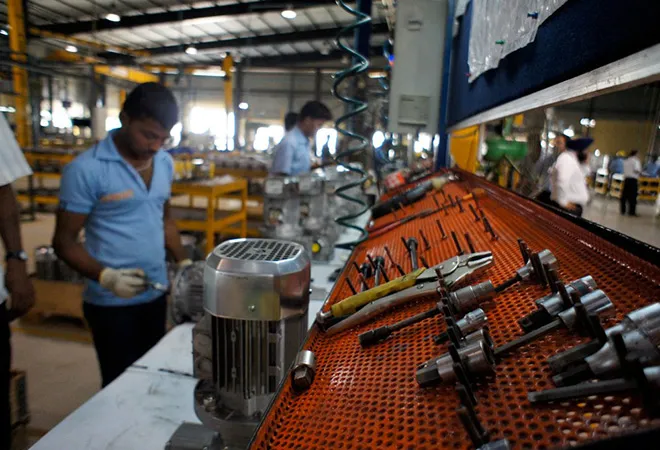-
CENTRES
Progammes & Centres
Location
The Factories Act ensures that working conditions of Indian labour are humane and entitles them to protection against loose processes.

Image Source: Rajesh Pamnani — Flickr/CC BY-NC-ND 2.0
The following is a chapter from the book 70 Policies that Shaped India: 1947 to 2017, Independence to $2.5 Trillion.
Find the book here.
A legacy law operating since 1881, The Factories Act <1> was comprehensively enacted on 23 September 1948 to protect workers in factories, by consolidating and amending the law that regulated condition of labour in factories. In tune with the thinking of the day, that all entrepreneurs are evil and all government good, it has provisions for penalties of up to seven years’ <2> imprisonment for violations of hazardous processes and six months for minor violations, with a ‘chief inspector’ holding the power to prosecute. Amongst other things, the chief inspector can enter any factory, make examinations, seize records and report violations that could relate to painting (once every five years), internal walls (once every 14 months), toilets, canteens, and cool drinking water during the months of March, April and May. The Act created an entire factory of inspecting bureaucrats, from chief inspectors to officers. Since labour is in the concurrent list, in addition to this Act, there are various ‘shops and establishment’ acts that regulate the working conditions of labour, which entrepreneurs need to follow. The Factories Act has been amended seven times, <3> in 1949, 1950, 1951, 1954, 1970, 1976 and 1987. The Bhopal Gas tragedy in 1984, <4> for instance, introduced a separate chapter on hazardous processes <5> in the 1987 amendment. The 1987 amendment inserted sections for precautions against dangerous fumes <6>, precautions in case of fire <7>, and compulsory disclosure of information by the occupier <8>. In the 30 years since then, the Act has remained unchanged. Being an emotive and human issue, policies that try and align the interests of capital and labour, unless in favour of the latter, are difficult to debate, let alone enact. The Factories (Amendment) Bill of 2016, for instance, attempts to double the limit of overtime hours to 100 hours per quarter <9>, but empowers the central and state governments to grant exemptions <10>. The Factories Act ensures that working conditions of Indian labour are humane and entitles them to protection against loose processes. It also raises the cost of such entitlements and, in an era of artificial intelligence and robotics, may nudge capital away from labour.
<1> The Factories Act, 1948, Ministry of Law and Justice, Government of India, 23 September 1948.
<2> Ibid., Section 96A.
<3> The Factories (Amendment) Bill, 2016, Statement of Objects and Reasons, 9 August 2016, accessed 28 December 2017.
<4> Roli Varma and Daya R. Varma, “The Bhopal Disaster of 1984,” Bulletin of Science, Technology & Society 25, no. 1 (February 2005), accessed 28 December 2017.
<5> Ibid., Chapter IV A, Provisions Relating to Hazardous Processes.
<6> Ibid., Section 36.
<7> Ibid., Section 38.
<8> Ibid., Section 41B.
<9> Ibid., Section 3, Relating to Section 64 of the Principal Act.
<10> Ibid., Section 65, Relating to Sections 51, 52, 54 and 56 of the Principal Act.
The views expressed above belong to the author(s). ORF research and analyses now available on Telegram! Click here to access our curated content — blogs, longforms and interviews.

Gautam Chikermane is Vice President at Observer Research Foundation, New Delhi. His areas of research are grand strategy, economics, and foreign policy. He speaks to ...
Read More +